Art and Health
Act 1: The Role of Theater and Dance
Wednesday, October 16, 2024, 17:30-20:30
Conference and Cultural Center at the University of Patras
Patras, October 2024
Scientific and Artistic Supervision
Katia Savrami, Associate Professor of the Department of Theatre Studies at the University of Patras.
Agis Marinis, Associate Professor of the Department of Theatre Studies at the University of Patras and Director of the Laboratory of Drama and Speech.
Collaboration
Apostolos Vantarakis, Professor of Hygiene, Department of Medicine, at the University of Patras.
Konstantinos Asimakopoulos, Emeritus Professor of Psychiatry, Department of Medicine at the University of Patras.
Section I
Lectures (15 minutes each).
- What’s the Fox Doing in the Market? Creative Writing and Health, Gianna Roilou
- Art as a Return Gift, Antonis Volanakis
- Dance and Disability, Maria Koliopoulou
Discussion with the audience (10 minutes)
Section II
Poetry as Solo Performance: “ASCLEPIC: the Mirroring”
Choreography: Katia Savrami
Dancer: Theano Vantaraki (8 minutes).
Poetry in performance: Ginger F. Zaimis, Poet, Playwright & Literary Translator
Poetry as Solo Dance Performance “ASCLEPIC: the Mirroring”
The dramaturgy entitled, “ASCLEPIC: the Mirroring”, is a re-visioning, retelling, and reweaving of mythological and philosophical themes. With partial translations from various ancient papyri, prophecy and literary texts, the plot recalls the Ancient Greek demigod and Great Physician, Asclepius, in dialogue with Thoth the Atlantean, while integrating the theme, “The Art of Healing.” The literary work is composed as poetry, in rhyme and meter, in the English language while shaped by the poetic Quatrain. The title “Asclepic” is a fusion of words and the etymology thereof, the Greek word, Ἀσκληπιός, meaning “to cut open” and the word, epic. Both words, as the title suggest, enact the “cutting open and opening the anatomy of” to heal the unhealed essence of Humanity’s epic.
The poetry, written and narrated by Ginger F. Zaimis, is a collected composition spanning Ancient Greece, Rome, Hellenistic, and Pharaonic Egypt, as well as beyond. Names, titles, and references are presented through the Greek pantheon and the aforementioned mythologies, stories, and philosophies where available. In this context, we find the Great Physician, Asclepius, in dialogue with Thoth the Atlantean (also known as Hermes Trismegistus). “Asclepic: the Mirroring”, the choreography of the dance, are an embodied performance, interpreted by the choreographer, Katia Savrami, to reread and redefine the ‘collective composition’ of the poetry within context and to reflect on its bodily expressions and performative elements enacted by the dancer, Theano Vantaraki, while emphasizing its culturally sustainable, timeless, and conscious perspective. The composition of movement and the interpretation of the two-dimensional (text) breathe life into a three-dimensional (3D) performance and beyond, while introducing the concept of intertextuality, where the choreographic artwork reveals the inherent qualities, textures, and layers of the poem, while creating a fluid connection. It is through this collective composition, the poet employs one of her distinguishing features as a writer and storyteller (i.e. the progression of mythos and logos experienced through poetic dialogue composed in the English language and presented through the archetypes, Asclepius and Thoth). Likewise as does the choreographer, who places letters and words, rhythm, and interpretation in contrast (with the expressiveness and embodied texture of the performance). Zaimis, Savrami and Vantaraki connect and assimilate interdisciplinary layers that manifest through the oral tradition of poetry in performance and solo dance to offer holistic reception. The collective work, as poetry in choreographed solo dance performance, is presented by the Laboratory of Drama and Speech of the Department of Theatre Studies at the University of Patras. And it is here through the performing arts, our narrative unfolds while recalling and remembering ancient wisdom and suggestion for Humanity, as per Asclepius and Thoth, Royal Scribe, Keeper of Records, Master of Mysteries and Time…
Section III
Lecture Demonstration (15 minutes, interaction with the audience).
- Theater, Illness, and Health: “A Remedy for Their Pains”, Maria Frangi
- Body, Movement, Wholeness, Nikos Lyberatos
Discussion with the audience (10 minutes)
Section IV
Group performance “STUDY” (video, 10 minutes).
Music composition by John Adams, titled Fearful Symmetries (10 minutes).
Choreography: Tatiana Loverdou.
Performed by the students at the Higher Professional Dance School and Arts Center DANSARTE by Tatiana Loverdou.
Summary – Discussion with the audience
Κ. Savrami, Associate Professor of the Department of Theatre Studies
K. Asimakopoulos, Emeritus Professor of Psychiatry, Department of Medicine
Biographies of Contributors
Adonis Volanakis (b. 1976) is a visual artist and Assistant Professor in the Department of Theatre Studies at the University of Patras. He studied/researched at Wimbledon College of Art, Saint Martins College of Art, Aalto University (Helsinki), École Nationale Supérieure des Arts Décoratifs (Paris), the University of Athens, and New York University/ NYC. His art practice is a collaborative amalgam of fine and performing arts, human connectedness and aesthetics, poetry and politics. Since 2003 his work focuses in herstories and since 2006 he facilitates blind date, a togethering collaborative platform. He creates installations, performances, exhibitions, and public sphere actions alongside communities in the United States, England, Switzerland, Georgia, France, Canada, the Czech Republic, and Finland. Since 2005, he has been continuously teaching and researching in higher education in Greece, Cyprus, France, and the USA. Foundations that support his works are: Fulbright, Linbury, Onassis, London Institute, Arts and Humanities Research Board/UK, B&E Goulandris, Propondis, Spyropoulos and Leventis.
Ginger F. Zaimis is an American poet, playwright, polymath, and literary translator specializing in Classical and perennial forms. She is the author of seven monographs and architect of two new poetic forms (the Portico and Triptych). Ginger’s vision and grammatology explore the intersections of contemporary modernisms and comparative literature through her progressed mythos and logos of Aeschylus, Sophocles, Asclepius, Plato and other dramatic works while reuniting the Arts, Humanities and Sciences as one. Her literary and philosophical translations from the Ancient Greek to English verse include the Stoic, Cleanthes’ Hymn to Zeus (in Sestina), excerpts of Aristophanes’ Frogs, and Marcus Aurelius’ Meditations, a work-in-progress. Her work has been presented at world museums, universities, libraries, exhibitions and biennials, as well as keynotes at Freud Museum London, Bibliotheca Alexandrina, the Gabelli Speaker Series NYC, the American School of Classical Studies in Athens, and the Centre for Greek Philosophy at the Athens Academy, among others. Her poetry is translated into Modern Greek, Bengali, Albanian, Arabic, and Italian; and she is PEN America’s finalist for Best First Poetry Collection (2015), a Keats-Shelley Rome fellow (2017), as well as educator and Board Member of Fordham University London (2021-present).
Maria Koliopoulou is a female artist, activist, choreographer, performer and dance teacher with immigrant roots living and working in Athens. She earned a scholarship to the Laban Centre fοr Movement and Dance and studied Fine Arts at Vacalo School of Arts & Design in Athens. She is a founding member of Prosxima Dance Company where she choreographs and performs since 1996. In recent years she has presented works commissioned by the Onassis Stegi, the Athens Festival, the Ephorate of Greek Antiquities and the International Contemporary Dance Festival of Algiers. Her choreographic works have been presented in Athens, Algiers, Vienna, Karlstadt, Ljublana, Salzburg, Stockholm, Prague, Budapest, Chania, Serres and Kavala. She is an awarded artist of the Dance Research NRW, a scholarship of the NRW KULTURsekretariat – funded by the Ministerium fur Kultur und Wissenschaft des Landes Nordrhein-Westfalen. She has been awarded the Jarmila Jeřábková award (2008) at the New Europe Festival in Prague and the 2nd Prize at the International Contemporary Dance Festival of Algiers (2013) in Algiers. She has collaborated with Onassis Stegi in the Unlimited Access, iDance: Dance without Discriminations and Europe Beyond Access program.
Nikos Lyberatos, holds a BA diploma in Dance Performance from Roehampton University, is a graduate of the Department of Physical Education and Sports Science at the University of Athens and graduated from the Acting Studio of Akis Davis. He is certified teacher in Yoga, Pilates, and Thai Yoga massage. As a Fulbright scholar in New York, he trained in contemporary dance at the Trisha Brown Dance Company studio (technique, repertoire, improvisation, composition), at Movement Research and at Dance Space Center, studied movement analysis at the Laban Bartenieff Institute, and movement for actors with the Siti Company (Suzuki training, Viewpoints technique). He has studied somatic techniques, Alexander, Feldenkrais, Body Mind Centering, Axis Syllabus, Butoh, contact improvisation, dramaturgy, experiential anatomy, craniosacral therapy, tissue release, as well as meditation techniques. As a dancer and choreographer has collaborated with several dance companies, theaters and festivals, such as International Festival of Ancient Drama of Delphi, Greek Choreographers’ Festival, International Festival of Patras and Thessaloniki, Mediterranean Biennale of Italy, Patras Cultural Capital of Europe, Regional and Municipal Theatre of Patras. International Opera Studio of Patras. He has also performed in theater. For many years, and in different venues, he has been teaching and researching dance and movement as an art, education, and therapy.
Agis Marinisis an Associate Professor of Ancient Greek Philology and Ancient Theatre in the Department of Theatre Studies at the University of Patras and Director of the Laboratory of Drama and Speech. He studied Ancient Greek Philology in Athens and Cambridge (BA, MPhil) and received his doctorate from the University of Cambridge. His research focuses on ancient lyric poetry as well as ancient Greek tragedy and its diachronic reception, with particular emphasis on Aeschylus and the study of Seven Against Thebes. His scholarly interests also focus on the reception of ancient Greek tragedy in Flavian poetry. A further area of his research is the use of masks in Greek theatre in comparison with later theatrical traditions. Within this framework, he led the research project “The Mask in Commedia dell’Arte and Ancient Greek Comedy: Towards a Comparative Approach, with Emphasis on the Methodology of Acting” (Funded by the National Strategic Reference Framework, 2019-2021). His recent publications include Poetics and Religion in Pindar: Ambits of Performance and Cult (Routledge, 2024) and Elements of Tragedy in Flavian Epic, co-edited with Sophia Papaioannou (De Gruyter, 2021).
Yianna Roilouwas born in Athens and lives in Patras, where she teaches laboratory and theoretical courses in the Department of Theatre Studies at the University of Patras. She studied modern Greek literature at the University of Athens and theatre in England, where she obtained her Ph.D. (Department of Theatre Studies, University of Lancaster, 2003). She has worked as a writer and dramaturg for productions at the Theatro Neon and the Municipal Regional Theatre of Agrinio and has collaborated with Lithographion and Kantharos in Patras. She is a member of the Board of Directors of the Municipal Regional Theatre of Patras. Her publications include Theatre for Children 2: Theatre and School (editor), a publication of the Greek Centre for Theatre for Children and Young People (2002) (funded by the Ministry of Culture), four volumes of original fairy tales under the general title Stories, published by Kokkini Klosti Demeni (2009), Ancient Greek Tragedy and Hellenikotita: The Making of a Greek Aesthetic Style of Performance, 1919-1967, published by VDM Verlag Dr. Müller (2009), the poetic composition The Journey of Ka in Khat, published by Giannis Pikramenos (2010), the play One Thousand and One Stories of the Desert, published by Astir Publishing House (2018), and the science fiction play Sphinx 2081: The Cities of Water, published by Sokoli Publishing House (2020).
Katia Savramiis an Associate Professor in the Department of Theatre Studies at the University of Patras. She studied dance at the “Higher Professional Dance School: Rallou Manou.” She holds a Master of Arts and a PhD in Dance Studies from City University London (Laban Centre), where she specialized in dance studies, choreography, and dance education. She taught Choreological studies at the “Professional dance school of Rallou Manou”, at the “Greek National Opera, Ballet professional dance school”, and at the “State School of Dance” the only state professional school in Greece. A writer on dance for the Hellenic Open University, she has published a series of books and articles on dance in Greek and English. She is also a member of the International Editorial Board of the academic journal Research in Dance Education, UK, and editor of the international academic journal Choros International Dance Journal, supported by the A.S. Onassis Public Benefit Foundation. She was a member and tutor of the Imperial Society of Teachers of Dancing in London and has served as vice president of the Greek Centre of the International Theatre Institute and as director of the Laboratory of Drama and Speech (2020-23). She has also received awards and honors in choreography in Greece and abroad. Katia is a scholar of the A.S. Onassis Public Benefit Foundation and served as secretary of the Board of Scholars of the foundation until June 2009, and as a member of the evaluation committee for the awarding of dance scholarships by the Onassis Foundation, until 2014. Furthermore, she is a Fulbright scholar, researching on the topic, The Ancient Dramatic Choruses, as a Visiting Scholar, in fall semester 2021, at the Department of Classics, Program in Hellenic Studies, Columbia University, New York, USA.
Maria Frangiis a Theatre Director-Theatrologist, a member of the Special Teaching Staff of the Department of Theatre Studies at the University of Patras, specializing in Education, Theatre Institutions, and Production – Theatre for Children and Adolescents. She graduated from the Drama School of the Piraeus Association Conservatoire and from the Faculty of Philosophy of the National and Kapodistrian University of Athens. She holds a PhD in Humanities with a specialization in the Arts of the Spectacle – Theatre from the University of Paris X-Nanterre (1996). She conducted postdoctoral research at the University of Paris IV-Sorbonne on Theatre for Children and Adolescents. She has been teaching at higher education institutions in Greece and abroad since 1997. She is an author of articles and books on theatre (Theatrical Education for Grades 5-6, The Performative Act in Education) and has developed Study Programs and Guides for Educators around the Art of Acting, Artistic Education, and Theatre in Education and Society. She teaches at the postgraduate programs (Master’s degree): 1. “Religious Education and Training” in the Department of Social Theology & Religious Studies at the National Kapodistrian University of Athens: Theatre and Performing Arts in Religious Education. 2. Department of Modern Greek Language and Literature, University of Cairo, “Literature-Theatre”.
Theano Vantarakiis a graduate of the “Professional Dance School of Mari Hatzimihali” and a senior student of the Department of Theatre Studies at the University of Patras. As a dancer, in collaboration with the Laboratory of Drama and Speech of the Department of Theatre Studies, and the Hygiene Laboratory of the Medical School, she created and danced the solo “Hourglass” in collaboration with Associate Professor Katia Savrami, as part of the 7th Symposium “Public Health in the Spotlight,” held in December 2023 at the Conference Center of the University of Patras. Also, within the framework of the program “Childhood Obesity in the Spotlight, Good Practices,” organized by Apostolos Vantarakis, and the Hygiene Laboratory of the Medical School, she collaborated with Associate professor Katia Savrami and the Laboratory of Drama and Speech of the Department of Theatre Studies and danced with the teenage contemporary dance group of the Dance and Arts Center DANSARTE, by Tatiana Loverdou, in a conference and performance addressing childhood obesity. The performance was presented in September 2024 at the “Epikentro” theater. Currently, she collaborates with the Dance and Arts Center DANSARTE of Tatiana Loverdou, where she is responsible for the children’s classes and teaches creative dance, classical and contemporary dance.
Tatiana Loverdouundertook pre-professional studies at the dance school of Leonidas De Pian in Athens, while simultaneously attending the Higher Industrial School of Thessaloniki. She graduated from the “Professional Dance School of Despoina Grigoriadou”. In 1990, she established the “Dance Center” and the dance group “Parousia” (which evolved into the current professional dance group “SaltoFuturo”). From 1989 to 1999, she attended seminars in Contemporary Dance (E. Hawkins, H. Limon, and Release techniques), Tai-Chi, Yoga, Body-Mind Centering, and Massage in Kalamata, Chania, Tinos, Athens, London, and New York. She also hosted workshops at her professional dance school in Patras, featuring these techniques. As a Fullbright scholar, she studied Body-Mind Centering® in the United States from 1999 to 2002 at Amherst College, Massachusetts, earning the titles of “Practitioner” and “Somatic Movement Educator.” In 2000, she took contemporary dance classes in New York (Trisha’s Brown School and Movement Research School). At the same time, she engaged in Yoga, training under teachers Patti Bradshaw, Konstantinos Giannetakis, Penny Chaplin, and she is a certified Yoga teacher. In 2008, she established in Patras, the Dance and Arts Center DANSARTE, combining the operation of the dance school and cultural events. She teaches Yoga and Contemporary Dance, drawing from Body-Mind-Centering, while also instructing B.M.C. in seminar circles. In recent years, she has hosted seminars on Axis Syllabus by Frey Faust in various educational circles, and she is a certified teacher of the method. She also taught at the Drama School of the Municipal Regional Theatre of Patras for three years. In 2015, she founded the first Higher Professional School recognized by the Ministry of Culture & Sports in Western Greece at the Dance and Arts Center DANSARTE, which she directs.
Synopsis for the performances
Poetry as Solo Performance “ASCLEPIC: the Mirroring”
The dramaturgy entitled, “ASCLEPIC: the Mirroring”, is a re-visioning, retelling, and reweaving of mythological and philosophical themes. With partial translations from various ancient papyri, prophecy and literary texts, the plot recalls the Ancient Greek demigod and Great Physician, Asclepius, in dialogue with Thoth the Atlantean, while integrating the theme, “The Art of Healing.” The literary work is composed as poetry, in rhyme and meter, in the English language while shaped by the poetic Quatrain. The title “Asclepic” is a fusion of words and the etymology thereof, the Greek word, Ἀσκληπιός, meaning “to cut open” and the word, epic. Both words, as the title suggest, enact the “cutting open and opening the anatomy of” to heal the unhealed essence of Humanity’s epic.
The poetry, written and narrated by Ginger F. Zaimis, is a collected composition spanning Ancient Greece, Rome, Hellenistic, and Pharaonic Egypt, as well as beyond. Names, titles, and references are presented through the Greek pantheon and the aforementioned mythologies, stories, and philosophies where available. In this context, we find the Great Physician, Asclepius, in dialogue with Thoth the Atlantean (also known as Hermes Trismegistus). “Asclepic: the Mirroring”, the choreography of the dance, is an embodied performance, interpreted by the choreographer, Katia Savrami, to reread and redefine the ‘collective composition’ of the poetry within context and to reflect on its bodily expressions and performative elements enacted by the dancer, Theano Vantaraki, while emphasizing its culturally sustainable, timeless, and conscious perspective. The composition of movement and the interpretation of the two-dimensional (text) breathe life into a three-dimensional (3D) performance and beyond, while introducing the concept of intertextuality, where the choreographic artwork reveals the inherent qualities, textures, and layers of the poem, while creating a fluid connection. It is through this collective composition, the poet employs one of her distinguishing features as a writer and storyteller (i.e. the progression of mythos and logos experienced through poetic dialogue composed in the English language and presented through the archetypes, Asclepius and Thoth). Likewise, does the choreographer, who places letters and words, rhythm, and interpretation in contrast with the expressiveness and embodied texture of the performance. Zaimis, Savrami and Vantaraki connect and assimilate interdisciplinary layers that manifest through the oral tradition of poetry, the composition, and the performance of the solo dance, to offer a holistic reception. The collective work, as poetry in choreographed solo dance performance, is presented by the Laboratory of Drama and Speech of the Department of Theatre Studies at the University of Patras. And it is here through the performing arts, our narrative unfolds while recalling and remembering ancient wisdom and suggestion for Humanity, as per Asclepius and Thoth, Royal Scribe, Keeper of Records, Master of Mysteries and Time…
Group Performance “STUDY”
The Choreography by Tatiana Loverdou, is a “STUDY” in movement, presented by dance students, inspired by the music titled FEARFUL SYMMETRIES by the American composer John Adams. The musical composition is, as its title suggests, is symmetrical, projecting the feeling of fear and anxiety. Phrases of four and eight meters are arranged from the beginning to the end of the piece, each articulated by apparent harmonic shifts and a persistent pulse. In FEARFUL SYMMETRIES, the choreography and the “expressive gestures” are emphatic and complement the musical style of pop and minimalist rock composition. It is an example, as John Adams states, of “traveling music” that supports the of fluidity of motion in a changing landscape. Similarly, the dance, that is realized in space and time through continuous transformations of bodily shapes and qualities of movement, provokes the viewer into a dialogue in the ‘here and now’ of the dance performance. The relationship that the choreography creates between music and dance emphasizes symmetry that stimulates visual perception and guides the viewers to form their own internal journey where conditions are constantly changing, just as in life. The choreography is presented at the welcoming of the new students at the University of Patras, invites them on this acoustic and visual dance journey.
Organization: EMVIO AMKE, Hygiene Laboratory, Department of the Medical School of the University of Patras, Laboratory of Performing Arts and Speech of the Department of Theatre Studies at the University of Patras.
Under the sponsorship of the Ministry of Culture.
Photos and videos from the event:
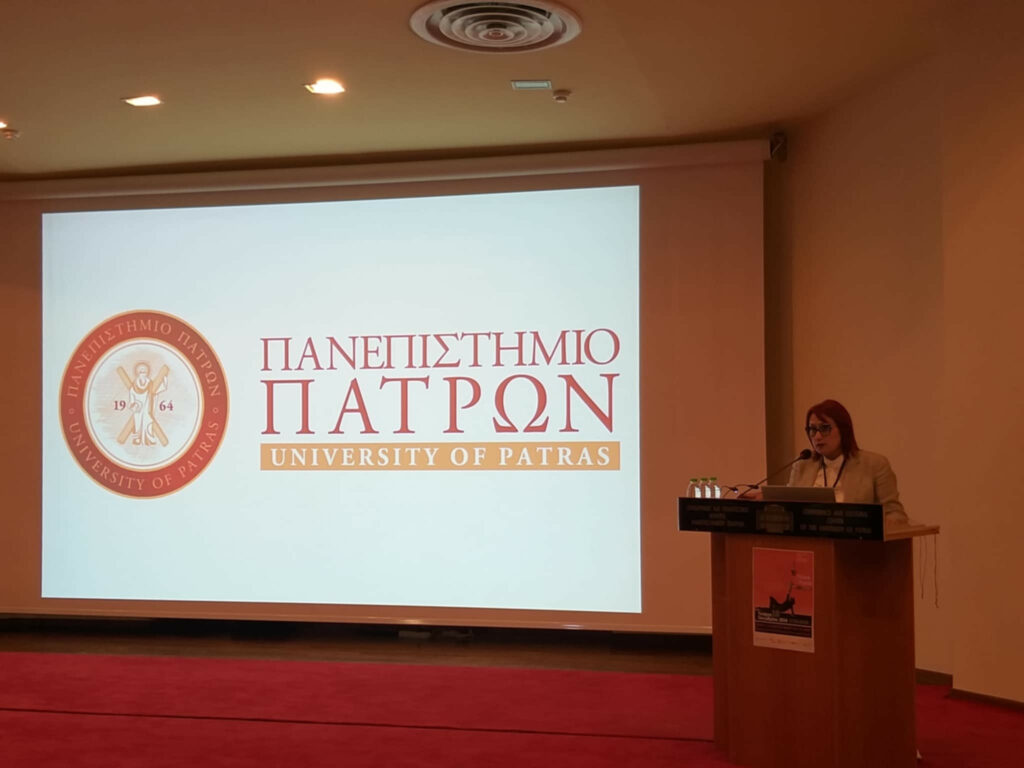
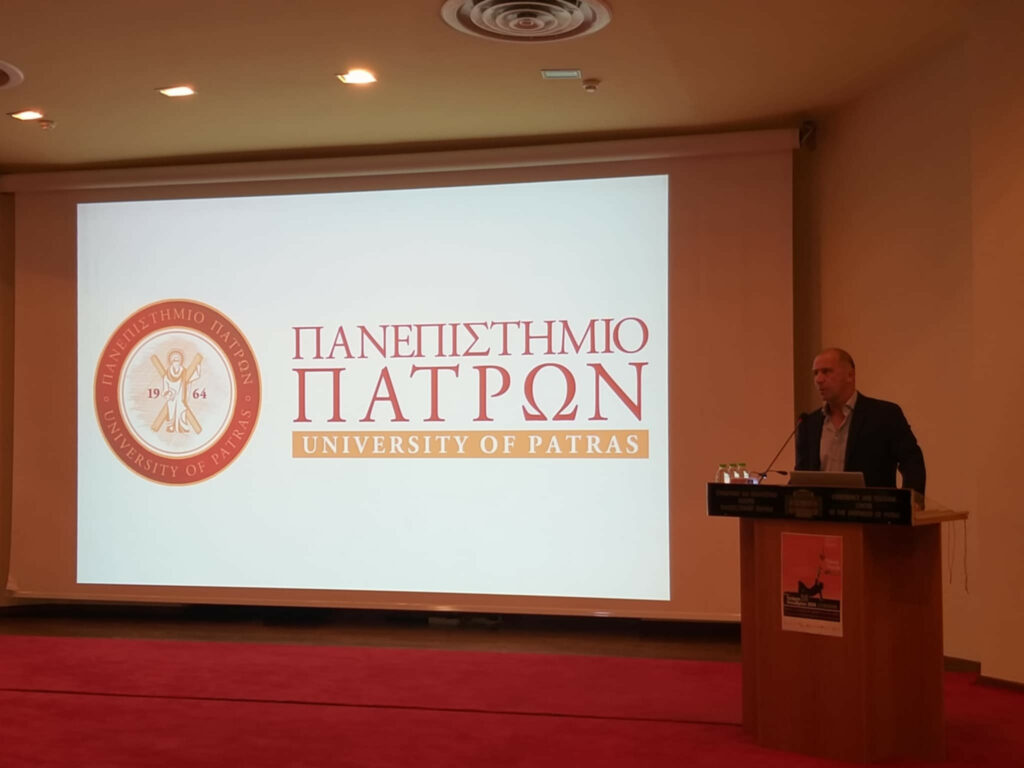
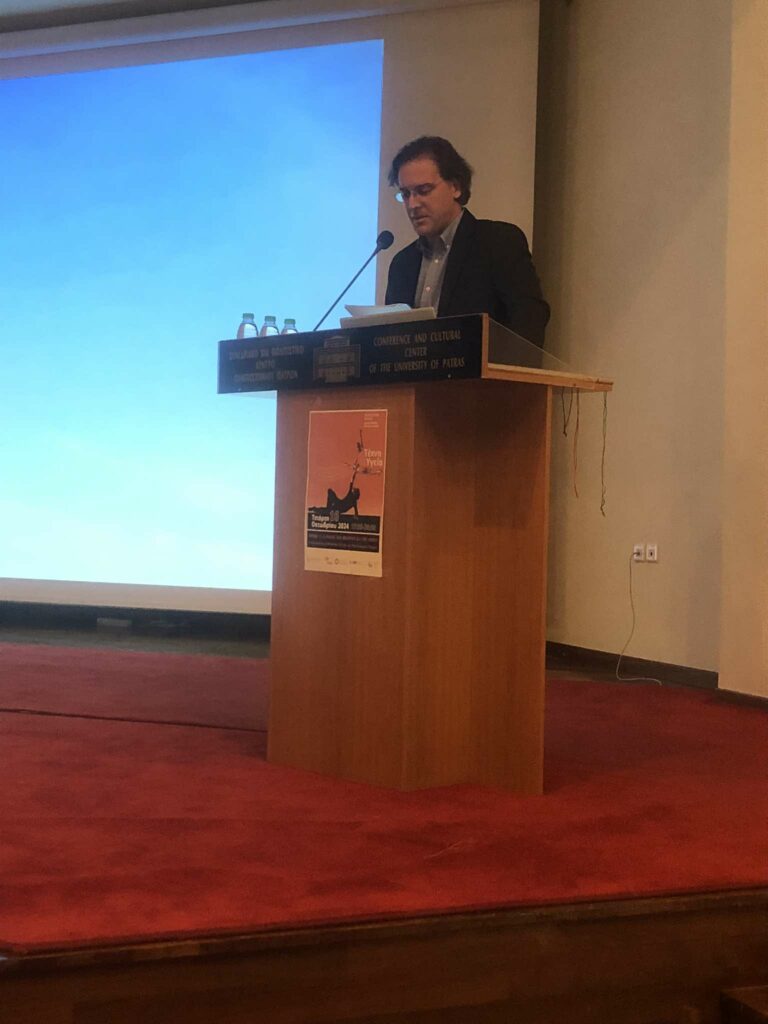
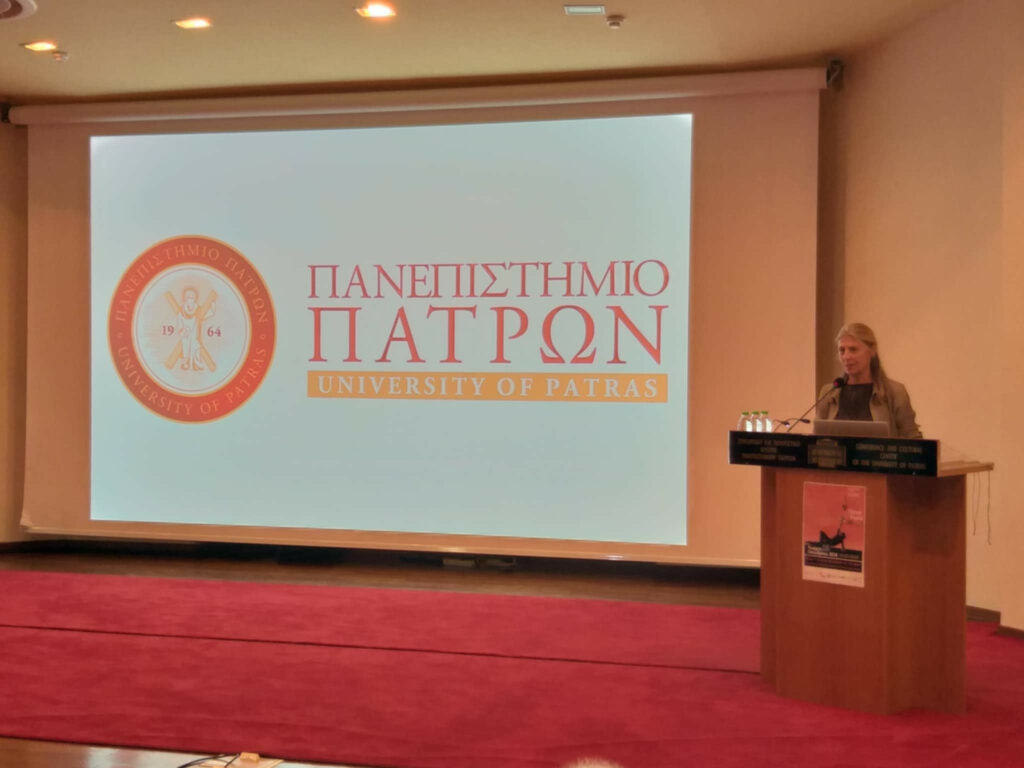
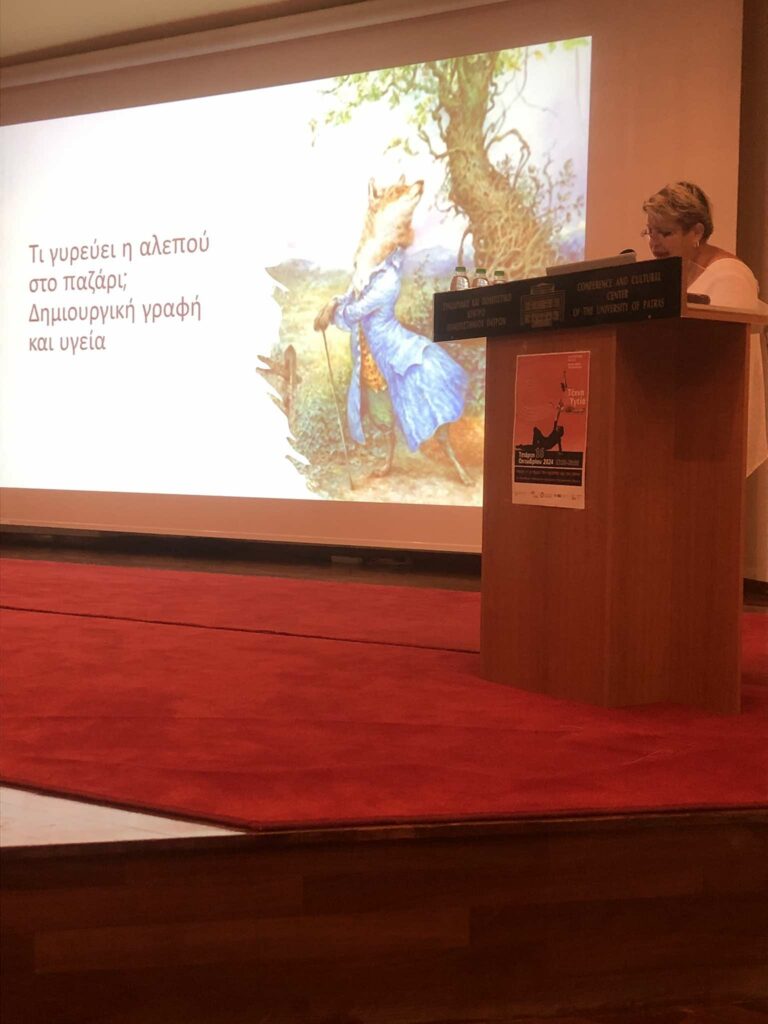
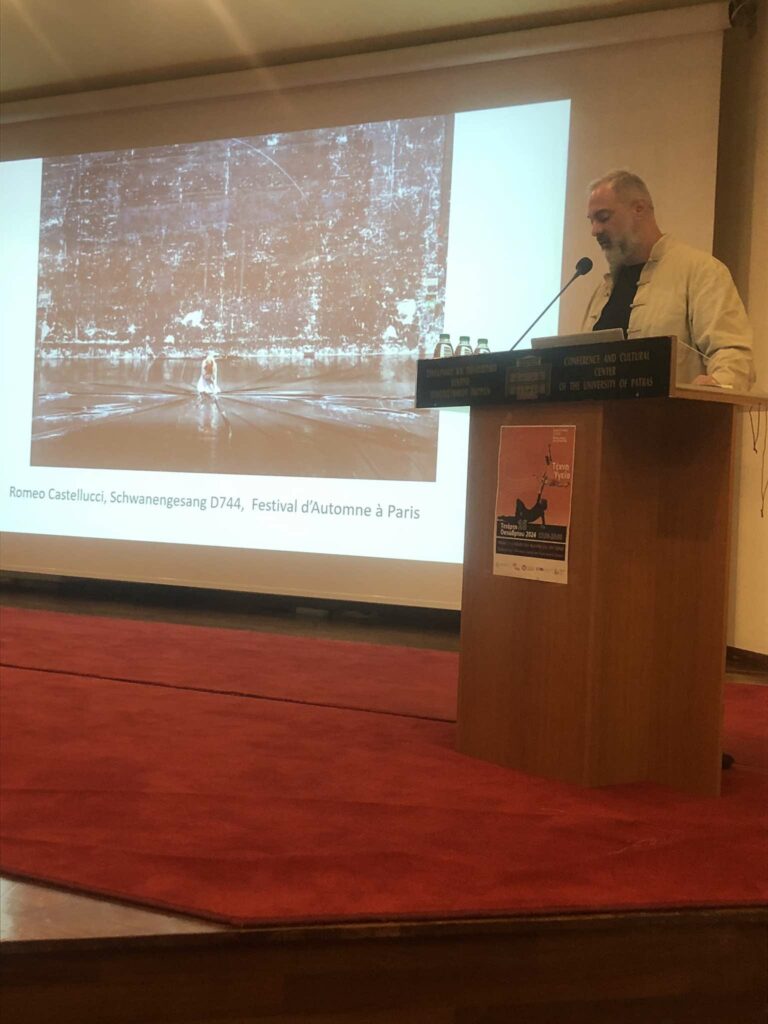
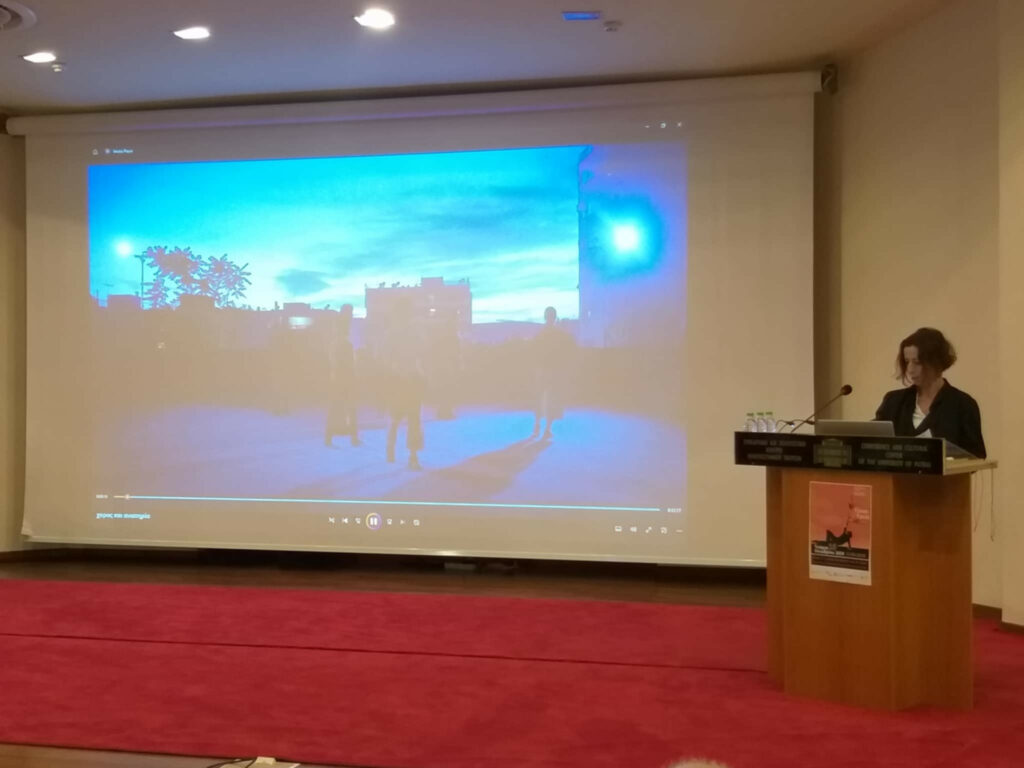
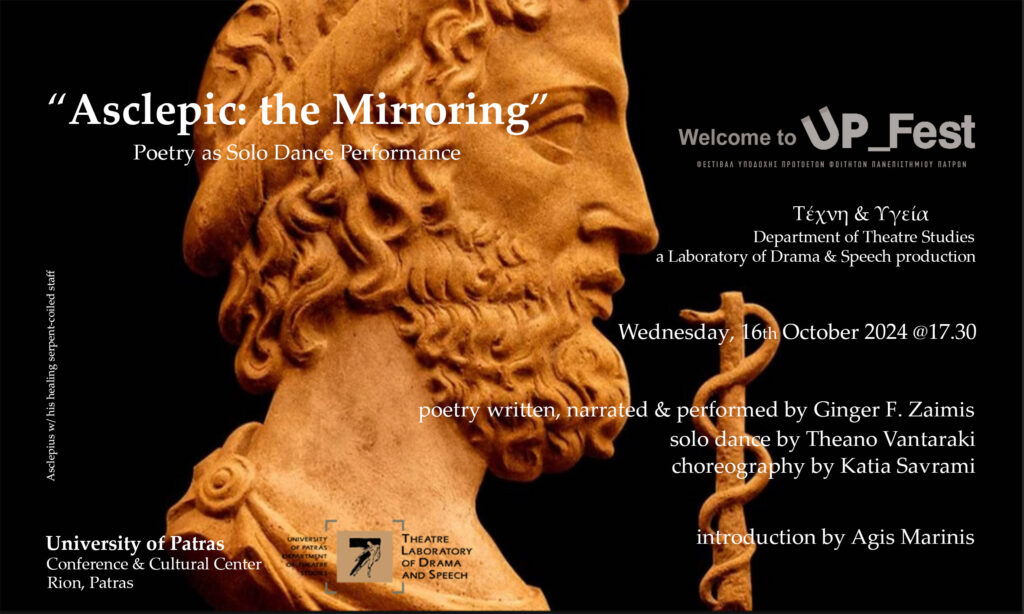
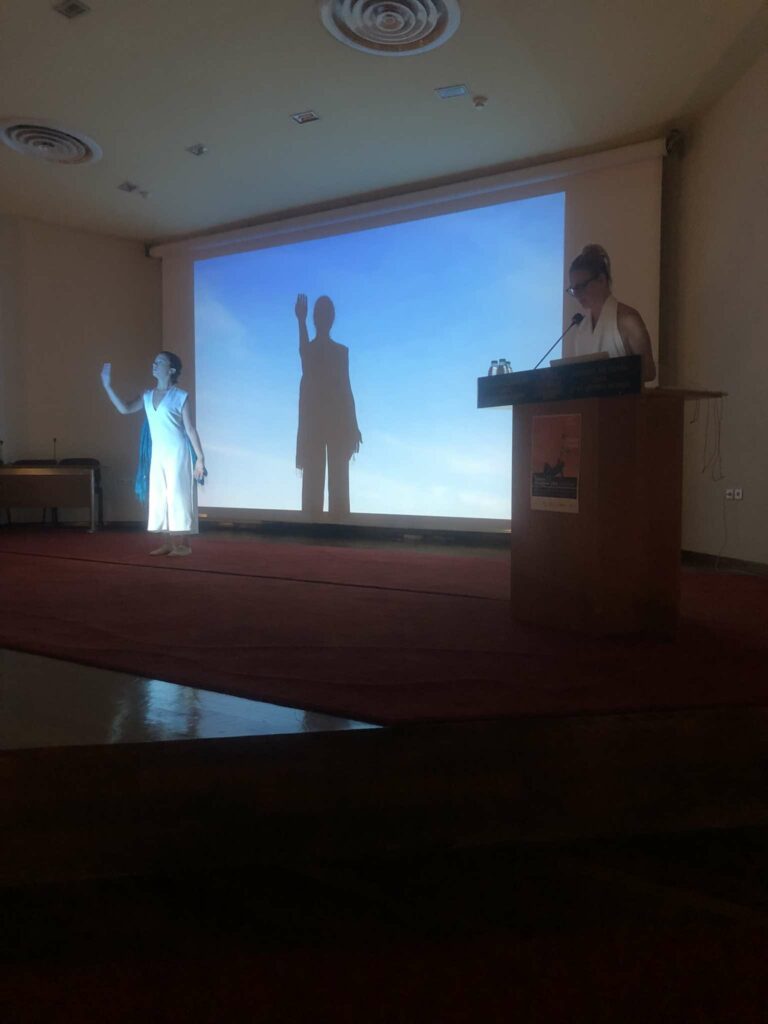
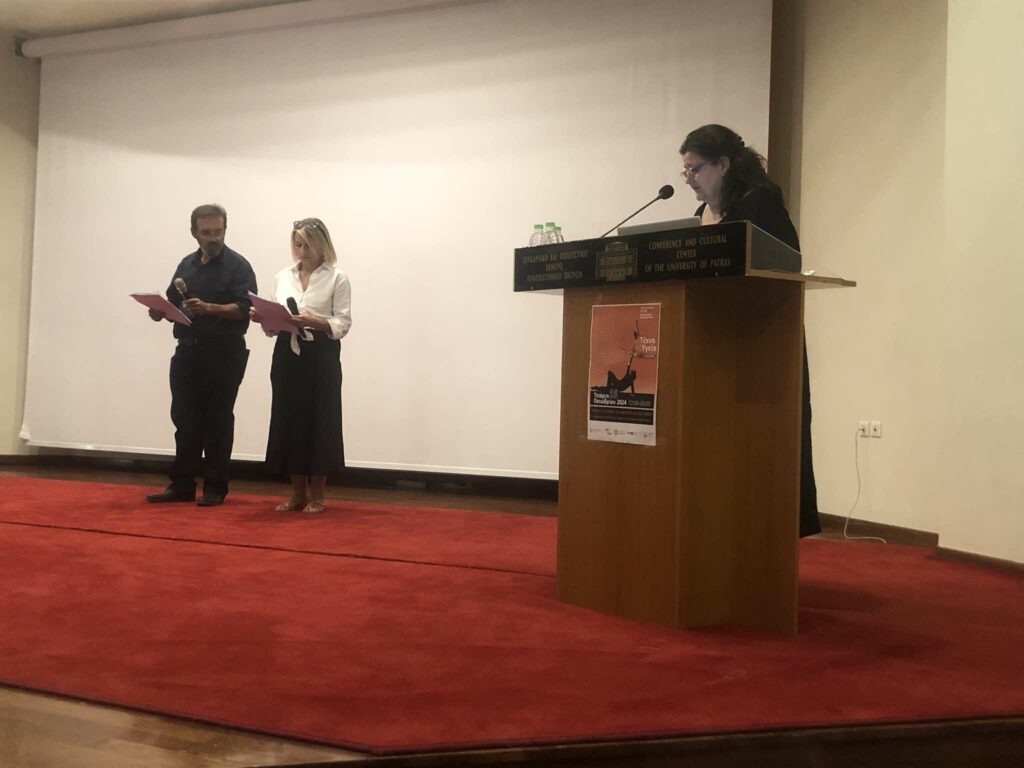
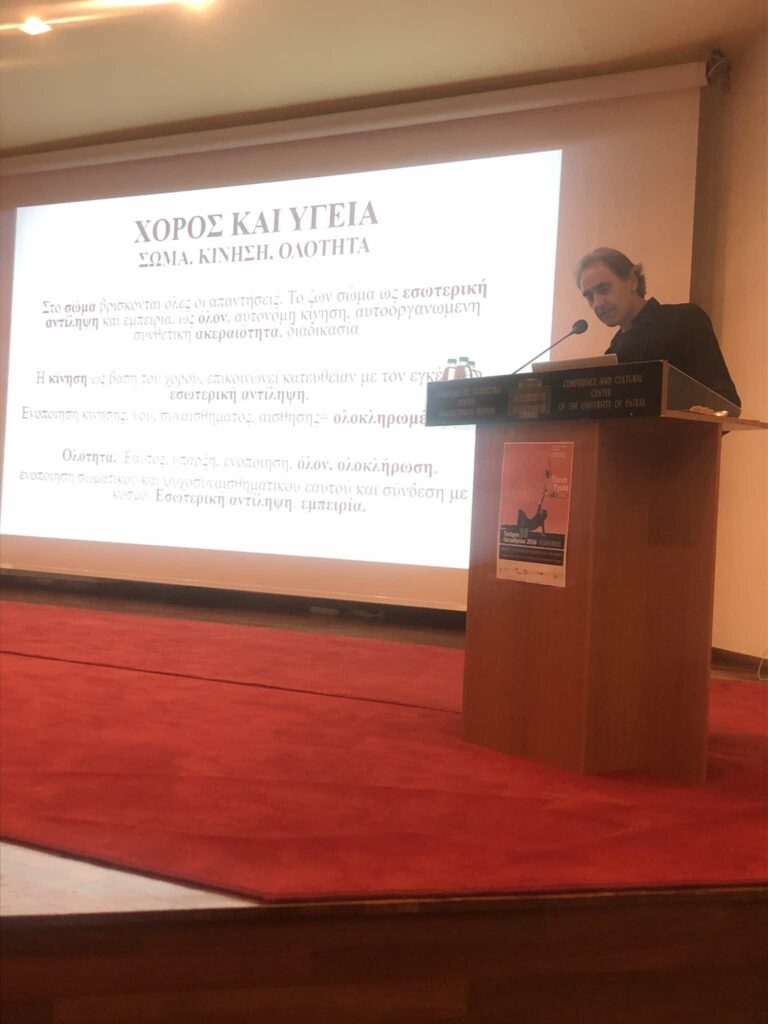
Watch αll the event here:
